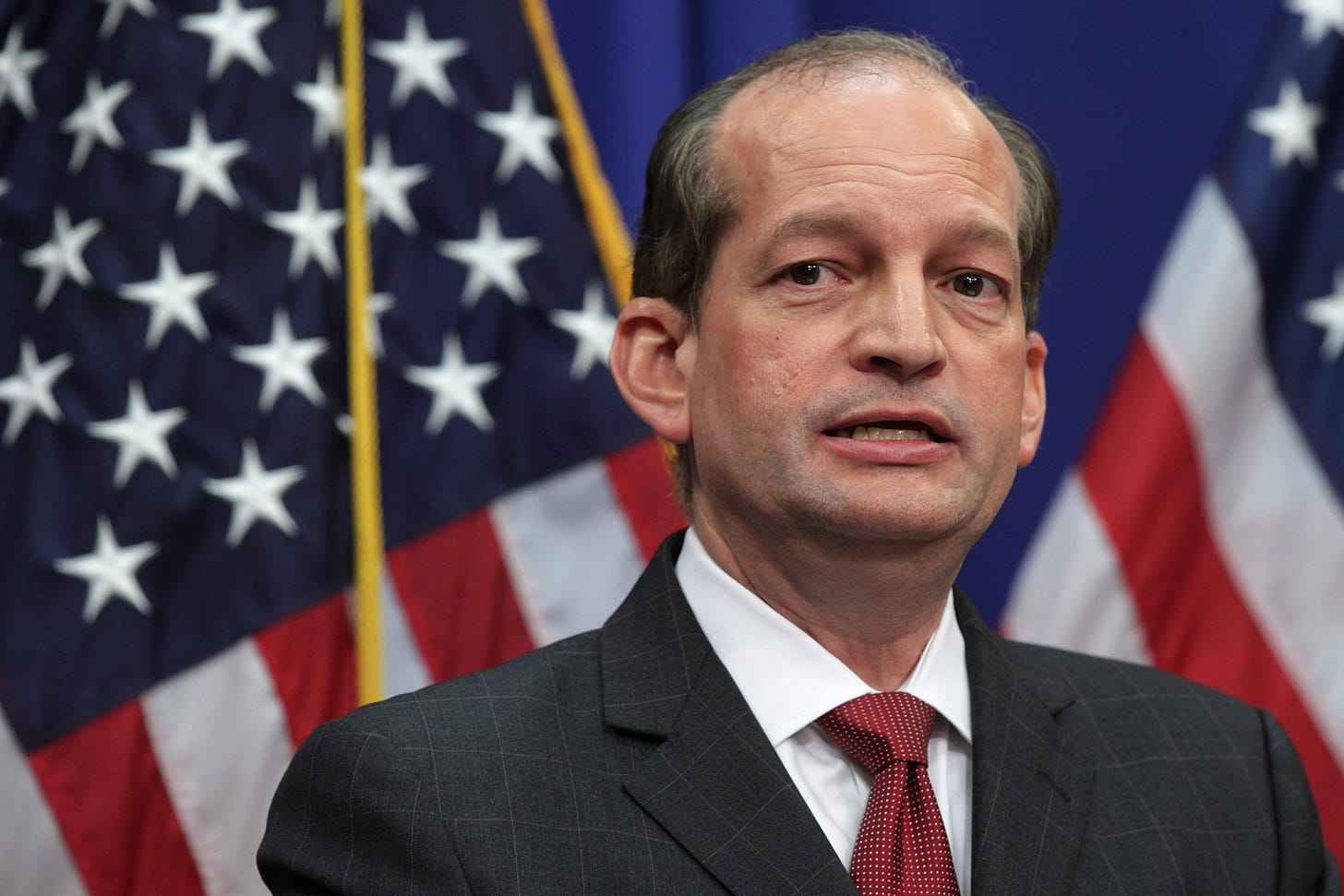Who Was Alex Acosta's Intended Audience at His Press Conference?
Was it the public, or was it his boss?

If Labor Secretary Alex Acosta hoped his Wednesday press conference addressing the sweetheart deal he gave sexual predator Jeffrey Epstein a decade ago would improve his reputation, he was largely mistaken. But the conference might have been enough to appease the one person whose opinion matters most.
Epstein was indicted this week by the U.S. attorney’s office of the Southern District of New York on charges of child sex trafficking. This caused some to remark: Hey, haven’t we been through this story before? And indeed we had: A decade ago, Epstein was brought up on charges of organizing a wide-ranging prostitution ring of underage girls at his Palm Beach home (and, purportedly, on trips to his private getaway in the Virgin Islands). Things looked grim for the well-connected multimillionaire—until it was suddenly announced in 2008 that he had struck a plea deal with prosecutors. The prosecutor calling the shots was the then-relatively unknown U.S. attorney for the Southern District of Florida: Alex Acosta.
It quickly became clear that the agreement Acosta and Epstein had reached was the sweetheart deal to end all sweetheart deals. Epstein ended up serving little more than a year in the county clink—with 12 hours’ release a day thrown in, six days a week, ostensibly so Epstein could keep up with running his business. Further, any of Epstein’s “potential co-conspirators” received full immunity from prosecution, a federal probe into Epstein’s criminality was called off, and, to top it off, the details of the plea were kept secret from Epstein’s own victims.
Bemusement over that deal has turned to widespread fury this week, as court documents reveal more and more damning details about the man Acosta let walk, such as the massive collection of child pornography seized from safes at his $56 million Manhattan mansion. How could Acosta have been willing to strike such a deal?
After days of laying low, Acosta emerged on Wednesday to take on his detractors at a lengthy press conference. His argument boiled down to this: In the long-ago, ideologically benighted year of 2008, he and his team were afraid they could not persuade a jury to believe the multiple underage witnesses who had come forward to accuse Epstein that they weren’t lying.
“Today, we know a lot more about how victims’ trauma impacts their testimony,” Acosta said. “Our juries are more accepting of contradictory statements, understanding that trauma-impacted memories work differently. And today, our judges do not allow victim-shaming by defense attorneys.”
Acosta repeatedly attempted to cast himself as a staunch advocate for Epstein’s victims, arguing that his top priorities were to ensure that Epstein wouldn’t get away scot-free—that his victims would be free to seek financial restitution, that he would go to jail at least for a while, and that he would be forced to register as a sex offender.
“These cases, as I said, are hard,” Acosta insisted. “They require a prosecutor to ask whether a plea that guarantees jail time and guarantees [sex offender] registration versus going to trial—how do you weigh those two, if going to trial is viewed as the roll of the dice?”
But those pleas for understanding fell flat, as Acosta failed adequately to address several major concerns about the deal, including why he had agreed to call off the federal investigation into Epstein l and why he had fully immunized any of the tycoon’s potential co-conspirators.
Further, aspects of Acosta’s narrative were called into question within hours of the press conference, as Barry Krischer, the former state attorney for Palm Beach County who was involved in the former state case against Epstein, issued a scathing statement saying Acosta “should not be allowed to rewrite history.”
“If Mr. Acosta were truly concerned with the State’s case and felt he had to rescue the matter, he would have moved forward with the 53-page indictment that his own office drafted,” Krischer said. “Instead, Mr. Acosta brokered a secret plea deal that resulted in a Non-Prosecution Agreement in violation of the Crime Victim’s Rights Act.”
There’s no question Acosta’s involvement in the Epstein scandal presents enormous difficulties for the White House. Donald Trump himself is a former associate of Epstein’s, and in 2002 described him thus: “He likes beautiful women as much as I do, and many of them are on the younger side. No doubt about it, Jeffrey enjoys his social life.”
If the president wanted to underscore that he’s distanced himself from Epstein, a registered sex offender, he could ask for Acosta’s resignation.
For the time being, though, Trump seems to be sticking with his labor secretary. On Tuesday, he said the story has made him feel “very badly” for Acosta.
One thing is for sure: Acosta definitely knows how to stack the deck in his own favor. Asked about the possibility of Trump firing him, the secretary put on a master class in Trump toadyship, emphasizing again and again how ready he was to do whatever his incredible boss required of him.
“I am doing my job,” Acosta said. “If at some point the president decides that I am not the best person to do this job, I respect that. I serve at the pleasure of the president. I thought yesterday that he was kind and he showed great support. But we have to remember, we are here because we are part of an administration that is creating jobs, that is creating growth, that is really transforming our economy and focusing it on the forgotten man and woman. And if at some point he says, look, you’re not the right person for this right now or you’re standing in the way, I respect that.”


